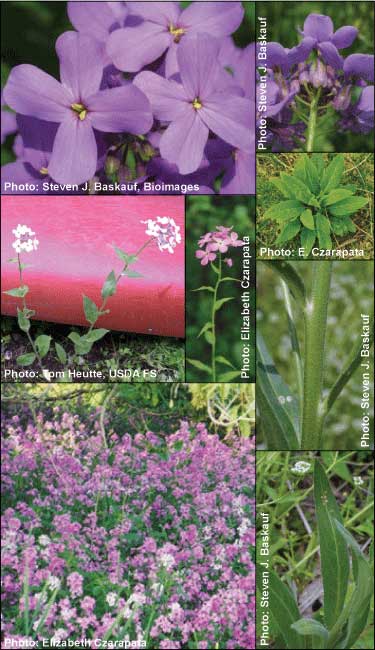|
Dame's Rocket (Hesperis matronalis)
What problems does dame’s rocket cause? Like many invasive plants, dame’s rocket forms monocultures that replace native plants in high quality natural areas, which in turn reduces critical food resources for birds, butterflies, and other wild creatures. Dame’s rocket is a relative of garlic mustard and often grows with garlic mustard. It has similar growth patterns and can take over habitat of native wildflowers and tree seedlings. What does dame’s rocket look like? Dame’s rocket is a biennial (2-year life cycle), a similar growing cycle to garlic mustard. It is a low rosette the first year and stays green all winter. The leaves are pointed, lance-shaped, and range from 2 to 6 inches long. They are alternate and get progressively smaller up the stem. The second year, dame’s rocket bolts to 2-4 feet tall and produces clusters of flowers. The flowers have 4 petals and range in color from white to purple. Flowers bloom in May and June and are very easy to spot. After flowering, dame’s rocket will produce long, thin, dark-colored seed pods. How do I manage dame’s rocket? First, don’t plant it! Use non-invasive options, like phlox. For established populations, treatment options vary depending on many factors, such as the density and environment that the plant is in. You can find very thorough treatment instructions using the Midwest Invasive Plant Network (MIPN) control database (http://mipncontroldatabase.wisc.edu/). Generally speaking, dame’s rocket can be managed much like garlic mustard; it can be pulled if there are a few plants, especially when the soil is moist. When pulling, make sure to remove the taproot and to dispose of the plant properly--in a plastic bag bound for the landfill, or carefully controlled burning of yard waste according to local ordinances. Dame’s rocket cannot be composted, as even underdeveloped seeds may mature and sprout. If dealing with a larger patch of dame’s rocket, herbicide may be useful; be sure to follow the label precisely. |
| habitatmatters.org |
Contact US231-252-4148
3334 Veterans Drive Unit A Traverse City, Michigan 49685 |
Pleasant Peninsula Design, Habitat Matters 2017


